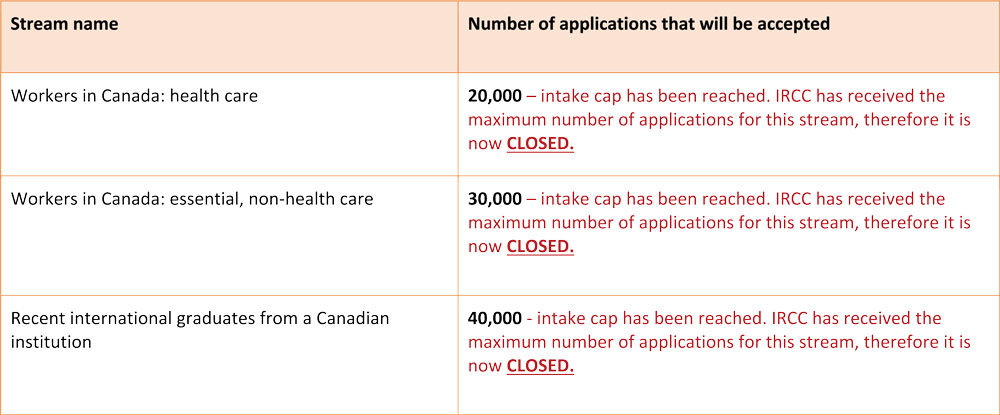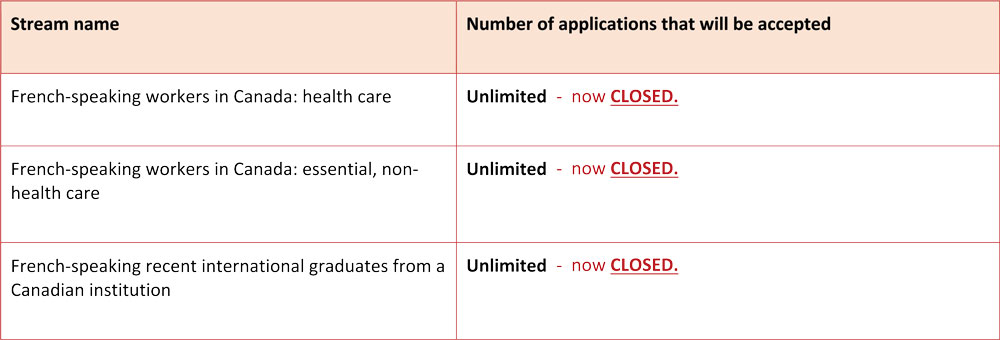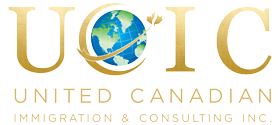TEMPORARY PILOT PROGRAMS
NEW PILOT PROGRAMS
To address specific labour shortages in the Canadian labour market, the government of Canada can initiate limited-term immigration programs. These pilot programs are designed to assist Canadian employers by targeting Canadian businesses and their local community labour needs. Whether you are a low-skilled, semi-skilled, or skilled worker, any one of the pilot programs may possibly be the right pathway for you.
NEW PILOT PROGRAMS
To address specific labour shortages in the Canadian labour market, the government of Canada can initiate limited-term immigration programs. These pilot programs are designed to assist Canadian employers by targeting Canadian businesses and their local community labour needs. Whether you are a low-skilled, semi-skilled, or skilled worker, any one of the pilot programs may possibly be the right pathway for you.
AGRI-FOOD PILOT PROGRAM
In May 2020, the Immigration, Refugee, and Citizenship Canada (IRCC) introduced a three-year Agri-Food Immigration Pilot Program to provide temporary foreign workers in the eligible occupations and industries in agriculture and food processing with a pathway to Canadian permanent residence. This pathway was introduced to help the labour needs of Canada’s Agriculture and Agri-Food Sector.
This program started accepting applications from May 15, 2020, and will accept until May 14, 2023, a total of 2750 applications will be accepted each year. Applications are processed on a first come first serve basis at the beginning of each year. This program primarily targets temporary foreign workers already in Canada, who have 12 months of full-time, non-seasonal Canadian work experience in one of the eligible occupations in meat processing, mushroom production, greenhouse crop production, or livestock raising.

Eligible Industries and Occupations under the Agri-Fool Pilot Program
Meat Product Manufacturing Industry
Eligible Occupations – retail butchers, industrial butchers, farm supervisors and specialized livestock workers, and food processing labourers.
Greenhouse, Nursery and Floriculture production, including mushroom production Industries
Eligible Occupations – harvesting labourers, general farm workers, farm supervisors and special livestock workers.
Animal Production (excluding Aquaculture) Industry
Eligible Occupations – general farm workers, farm supervisors and specialized livestock workers
Eligibility Requirements under the Agri-Fool Pilot Program
Candidates with Canadian work experience in the above listed occupations must meet the following eligibility requirements to qualify under the Agri-Food Pilot Program:
- Must have completed 12 months, full-time, non-seasonal Canadian work experience in one of the eligible occupations. This experience must have been obtained through the Temporary Foreign Worker Program
- Must have received an indeterminate job offer for full-time, non-seasonal work in Canada (outside of Quebec), wage offered must also be at or above the prevailing wage
- Must have obtained a Canadian Language Benchmark (CLB) 4 in English or French from one of the IRCC approved language tests.
- Must have the Canadian high school diploma OR foreign education equivalent to Canadian high school. For candidates educated outside of Canada, the Canadian equivalency of their highest level of education must be proved by obtaining an Educational Credential Assessment (ECA) report from one of the IRCC’s designated organization service providers.
RURAL AND NORTHERN PILOT PROGRAM

The Rural and Northern Pilot Program was launched in June 2019 and was designed as a community driven program, that would provide the benefits of economic immigration to smaller, remote communities in Ontario, Manitoba, Saskatchewan, Alberta and British Columbia. Canadian businesses in the participating communities have the ability to recruit skilled foreign workers for the employment opportunities within their company and provide candidates a pathway to permanent residency in Canada.
Each community will:
- assess prospective candidates who
- best fit the economic needs of the community
- have a genuine employment opportunity that meets their community requirements
- have the intention of staying in the community
- recommend candidates for permanent residence to IRCC for a final decision
- connect newcomers with settlement services and mentoring opportunities with established members of the community
Participating Communities under the Rural and Northern Immigration Pilot Program:
The following 11 communities are participating in the pilot program
1. West Kootenay (Trail, Castlegar, Rossland, Nelson), British Columbia
2. Vernon, British Columbia
3. Claresholm, Alberta
4. Moose Jaw, Saskatchewan
5. Altona/Rhineland, Manitoba
6. Brandon, Manitoba
7. Thunder Bay, Ontario
8. Sault Ste. Marie, Ontario
9. Timmins, Ontario
10. Sudbury, Ontario
11. North Bay, Ontario
Eligibility Requirements for Candidates under the Rural and Northern Immigration Pilot Program:
Candidates must meet the federal criteria as well as the requirements established by the participating community, where they are expecting to settle.
The Federal Criteria are:
Must have a recommendation from one of the designated communities listed above
Must meet the qualifying work experience or Canadian education
Have one year (minimum 1560 hours) of continuous work experience within the past 3 years
OR
- Have graduated from a publicly funded post-secondary institution in the recommending community
(Candidates’ previous experience must demonstrate that they can perform the job duties of the job offered)
Must have a genuine job offer to work in one of the designated communities listed above. Additionally, the job offer must be of the same skill level or one skill level above or below the NOC that best applies to the candidate’s work experience. Candidates whose NOC is rated skill level D, however, must have a job offer in the same occupation
Must meet the minimum language threshold for the NOC skill level type of the job position being offered
NOC 0 and A: Minimum language score of a CLB 6 is required
NOC B: Minimum language score of a CLB 5 is required
NOC C and D: Minimum language score of a CLB 4 is required
Must have the intentions to live in the community
Must have sufficient funds to settle and support themselves and their family in the community. Candidates who are already working in Canada legally at the time of application, will be exempt from the settlement funds requirement
ATLANTIC IMMIGRATION PILOT PROGRAM
The Atlantic Immigration Pilot Program was launched in 2017 in order to help support employers in the Atlantic Canada region to hire foreign skilled talent and retain them by giving the candidates this pathway for permanent residence. Four Atlantic provinces; Nova Scotia, New Brunswick, Newfoundland and Labrador, and Prince Edward Island are part of the pilot program.
These provinces will be able to identify, recruit, and retain global talent through this pilot program. In return, the designated provinces will be able to grow their population, develop a more skilled workforce, and increase employment rates in their regions.
There are 3 programs in the Atlantic Immigration Pilot Program:
√ Atlantic High-Skilled Program
√ Atlantic Intermediate-Skilled Program
√ Atlantic International Graduate Program

The First Steps to Apply for the Atlantic Immigration Pilot Program
Candidates must meet the federal criteria as well as the requirements established by the participating community, where they are expecting to settle.
The Federal Criteria are:
In order to participate in the Atlantic Immigration Pilot Program, candidates must receive a job offer from a designated employer from the Atlantic Canada Region. Employers do not need to go through the process of obtaining a Labour Market Impact Assessment (LMIA) under this program.
Before receiving a job offer, employers are also required to be designated by the provincial government of the Atlantic Province where the candidates will be employed. To be designated, your organization must:
- be in good standing
- have been operating in the Atlantic region for at least 2 years
- work with a settlement service provider organization to help your candidates get settlement services
Employers will be required to apply for designation once by one of designated the Atlantic provinces, they wouldn’t be required to apply for each candidate. Employers with locations in multiple provinces will be required to apply for a separate designation for each province. Employers must meet certain requirements, including a commitment to support the newcomer and their family as they integrate into their new life in Atlantic Canada. Once designated, employers would receive a “Confirmation of Designation” from the province.
Employers can hire through one of the following 3 programs under the Atlantic Immigration Pilot
Atlantic High-Skilled Program
General Requirements
- Job Offer from a designated employer: Job offer must be full-time, at least 1 year duration, non-seasonal, position is skilled and classified under NOC 0, A, or B. Job offer also needs to be supported by the province’s Certificate of Endorsement, that indicates the job offer is genuine, needs assessment has been completed and settlement plan is in place.
- Skilled work experience: Minimum of 1-year paid work experience that is in occupation related to job offer that was within the last 3 years
- Education: Minimum Completion of Secondary School (High School) or its equivalent. For candidates educated outside of Canada, the Canadian equivalency of their highest level of education must be proved by obtaining an Educational Credential Assessment (ECA) report from one of the IRCC’s designated organization service providers.
- Language: Level 4 of the Canadian Language Benchmark (CLB) in English or the Niveau de compétence linguistique Canadien in French
- Provincial Endorsement: Candidates must be endorsed by an Atlantic province and be issued the letter of endorsement
- Settlement funds: Candidates must show that they have enough money to support themselves and their family members, if applicable, after landing in Canada unless they are already working in Canada under a valid work permit. The amount of settlement funds required is determined by the size of the family.
Atlantic Intermediate-Skill Program
This category is for candidates who have received an eligible indeterminate job offer from an Atlantic Canada Region employer in a skilled or intermediate level occupation (NOC Skill type 0, Skill levels A, B or C) and have directly related work experience.
General Requirements
- Job Offer from a designated employer: Job offer must be full-time, indeterminate, non-seasonal, position is skilled or intermediate level and classified under NOC 0, A, B, or C. Job offer also needs to be supported by the province’s Certificate of Endorsement, that indicates the job offer is genuine, needs assessment has been completed and settlement plan is in place.
- Skilled work experience: Minimum of 1-year paid work experience that is in occupation related to job offer that was within the last 3 years
- Education: Minimum Completion of Secondary School (High School) or its equivalent. For candidates educated outside of Canada, the Canadian equivalency of their highest level of education must be proved by obtaining an Educational Credential Assessment (ECA) report from one of the IRCC’s designated organization service providers.
- Language: Level 4 of the Canadian Language Benchmark (CLB) in English or the Niveau de compétence linguistique Canadien in French
- Provincial Endorsement: Candidates must be endorsed by an Atlantic province and be issued the letter of endorsement
- Settlement funds: Candidates must show that they have enough money to support themselves and their family members, if applicable, after landing in Canada unless they are already working in Canada under a valid work permit. The amount of settlement funds required is determined by the size of the family.
Atlantic International Graduate Program
This category is for candidates who have graduated from an eligible post-secondary learning institution from Atlantic Canada’s region and received an eligible job offer of a minimum 1-year duration from an Atlantic Canada region employer in a skilled occupation (NOC Skill type 0, Skill levels A, or B).
General Requirements
- Job Offer from a designated employer: Job offer must be full-time, minimum 1 year duration, non-seasonal, position is skilled and classified under NOC 0, A, or B. Job offer also needs to be supported by the province’s Certificate of Endorsement, that indicates the job offer is genuine, needs assessment has been completed and settlement plan is in place.
- Skilled work experience: No prior work experience is required under this program
- Education: Completed a two-year post-secondary diploma from a publicly funded learning institution in the Atlantic region, obtained within the 12 months before the submission of the application for permanent residence.
- Language: Level 4 of the Canadian Language Benchmark (CLB) in English or the Niveau de compétence linguistique Canadien in French
- Provincial Endorsement: Candidates must be endorsed by an Atlantic province and be issued the letter of endorsement
- Settlement funds: Candidates must show that they have enough money to support themselves and their family members, if applicable, after landing in Canada unless they are already working in Canada under a valid work permit. The amount of settlement funds required is determined by the size of the family.
Temporary public policy for permanent residence pathways to Hong Kong residents

This temporary public policy has been in effect from June 1, 2021. This program provides a pathway for permanent residence for Hong Kong residents who are currently in Canada.
There are two streams for Hong Kong residents who have either worked or studied in Canada:
STREAM A: In-Canada Graduates – This stream is open to Hong Kong residents who have graduated within the last 3 years from an eligible post-secondary learning institution in Canada. Candidates are required to have been physically present in Canada, at least 50 % of the program during their studies (even if their classes were online).
STREAM B: Canadian Work Experience – This stream is open to Hong Kong residents who have at least 1 year of Canadian work experience and have graduated from a post-secondary learning institution in Canada or from overseas.
general requirements for each stream
STREAM A: IN-CANADA GRADUATES
To be eligible for this stream, you;
- Must hold a valid passport issued by one of the following:
- Hong Kong Special Administrative Region of the People’s Republic of China
- United Kingdom to a British National (Overseas) as a person born, naturalized or registered in Hong Kong
- Must be physically present in Canada when you apply and when you get permanent residence
- Must have valid temporary resident status in Canada
- Must intend to live in Canada, in any province or territory other than the province of Quebec
- Must have graduated from a post-secondary designated learning institution in Canada
- in the 3 years before you apply
- with one of the following:
- a diploma (not graduate or post-graduate) for a program of at least 2 years
- a degree (associate, bachelor’s, master’s or doctoral)
- a graduate or post-graduate diploma or certificate for a program of at least 1 year and
- with at least 50% of your program completed in Canada (either in person or online)
- Must meet the language proficiency requirement of a Canadian Language Benchmark (CLB) of 5 in English, or Niveaux de compétence linguistique Canadiens (NCLC) of 5 in French, in each of the four language skill areas of listening, speaking, reading and writing.
STREAM B: CANDIAN WORK EXPERIENCE
To be eligible for this stream, you;
- Must hold a valid passport issued by one of the following:
- Hong Kong Special Administrative Region of the People’s Republic of China
- United Kingdom to a British National (Overseas) as a person born, naturalized or registered in Hong Kong
- Must be physically present in Canada when you apply and when you get permanent residence
- Must have valid temporary resident status in Canada
- Must intend to live in Canada, in any province or territory other than the province of Quebec
- Must have graduated in the 5 years before you apply with one of the following:
- a diploma (not graduate or post-graduate) for a program of at least 2 years, or a degree (for example, an associate degree, a bachelor’s degree, a master’s degree or a doctorate) from a post-secondary designated learning institution in Canada
- a graduate or post-graduate diploma or certificate for a program of at least 1 year from a post-secondary designated learning institution in Canada
- a foreign educational credential equivalent to one of the following:
- a Canadian post-secondary diploma (not graduate or post-graduate) for a program of at least 2 years
- a Canadian post-secondary degree
- a Canadian graduate or post-graduate diploma or certificate for a program of at least 1 year
- Must have worked in Canada for at least 12 months full time (1,560 hours in total), or an equal amount of part-time hours in the 3 years before you apply. You must have obtained these hours legally in Canada, while you either had a valid work permit or you were exempt from needing a work permit
- Must meet the language proficiency requirement of a Canadian Language Benchmark (CLB) of 5 in English, or Niveaux de compétence linguistique Canadiens (NCLC) of 5 in French, in each of the four language skill areas of listening, speaking, reading and writing.
Temporary Public Policies for Temporary Resident to Permanent Resident Pathways
On May 6, 2021, the Government of Canada launched new pathways to allow eligible foreign workers in essential occupations, healthcare, recent international graduates, and francophones who are working in Canada to apply for permanent residency.
Candidates may be eligible to apply for permanent residence under this new public policy if:
- They have work experience in Canada in an essential occupation or in the health care services field
OR
- They have recently graduated from a Canadian post-secondary learning institution
There are 6 streams in this pathway. Each stream will be dedicated to either both English and French speaking candidates or specifically for only French speaking candidates. Each stream will remain open until November 5, 2021, or until they have reached their limit/cap intake.

General Streams

French-speaking Streams

General Eligibility Criteria for “Workers in Canada” streams
- Must have 1 year of work experience (at least 1,560 hours) in the past 3 years in one or more eligible occupations.
- Meet minimum language requirement Canadian Language Benchmarks (CLB) Level 4 for English or Niveaux de compétence linguistique canadiens (NCLC) Level 4 for French.
- Is currently working in Canada with authorization
- Must plan to live outside of Quebec
General Eligibility Criteria for “Recent International Graduates” streams
- Must have graduated from an eligible program at a Canadian designated learning institution (DLI) no earlier than January 1, 2017.
- Meet minimum language requirement Canadian Language Benchmarks (CLB) Level 5 for English or Niveaux de compétence linguistique canadiens (NCLC) Level 5 for French.
- Is currently working in Canada with authorization
- Must plan to live outside of Quebec
Interested in any of the following?
Applying for Canadian permanent residence under new pilot programs

